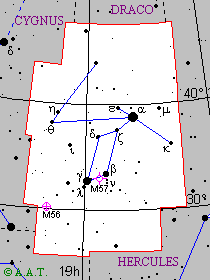 |
 |
| English name | Lyre or Harp | ||||
|---|---|---|---|---|---|
| Major stars | alpha Lyrae | Vega | magn. 0,0 | RA: 18h 36m 56.30s | Dec: +38° 47' 00.6" |
| gamma Lyrae | Sulafat | magn. 3,3 | RA: 18h 58m 56.61s | Dec: +32° 41' 22.3" | |
| Description | Notable constellation, even though not very wide, between Hercules and Cygnus. Lyra contains the fifth star of the sky in order of brightness: it is Vega a white-blue star, 26 light-years away. With Deneb of Cygnus and Altair of Aquila, Vega forms the so-called Summer Triangle. Near Vega there is epsilon Lyrae, a quadruple star also known with the name of Double double: it is composed, in fact, by a wide couple of white stars of fifth magnitude, easily separable with simple binoculars, and every of the two components is on its side a double (to see all the four stars you need instruments of a certain power). Other multiple stars are beta, delta and zeta Lyrae, separable with binoculars or small telescopes.
|
||||
| Mythology and history | The constellation represents the lyre built by Hermes with a turtle hull and given to Apollo, who gave it to Orpheus. Orpheus was a magnificent musician: when he sang and played all the creatures listened spellbound and followed him. Orpheus joined the Argonauts' expedition (see the mythology of Carina), which he helped when the ship Argus passed near the island where lived the Sirens, who enchanted the sailors, made them incapable to get further and made them die: the sound of Orpheus' lyre seduced them too making them harmless. Orpheus married the beautiful Eurydices. One day Aristheus tried to rape the young girl: running away, she stumbled over a snake that killed her with its poisonous bite. Therefore Orpheus went to the hereafter and asked that his adored wife was returned him: his song touched to the heart also Hades, god of dead, who allowed Eurydices to return to the alive world. On one condition: Orpheus didn't have to turn to look back, until Eurydices and he went out of the hereafter. But when they were almost at the end of the journey, Orpheus could not prevent himself from controlling that his wife was following and he turned round: and Eurydices was dragged back to the dead kingdom. Oppressed by the pain, Orpheus rejected all the women who offered to marry him: Ovid, in the Metamorphoses (book XI, vv. 1-66), tells that then a group of women, offended by his refusal, attacked him and tore him to pieces. The shade of Orpheus went down in the hereafter, where he remained forever with his beloved Eurydices: Eurydicenque suam iam tutus respicit Orpheus. |
||||
 Back to constellations page.
Back to constellations page.